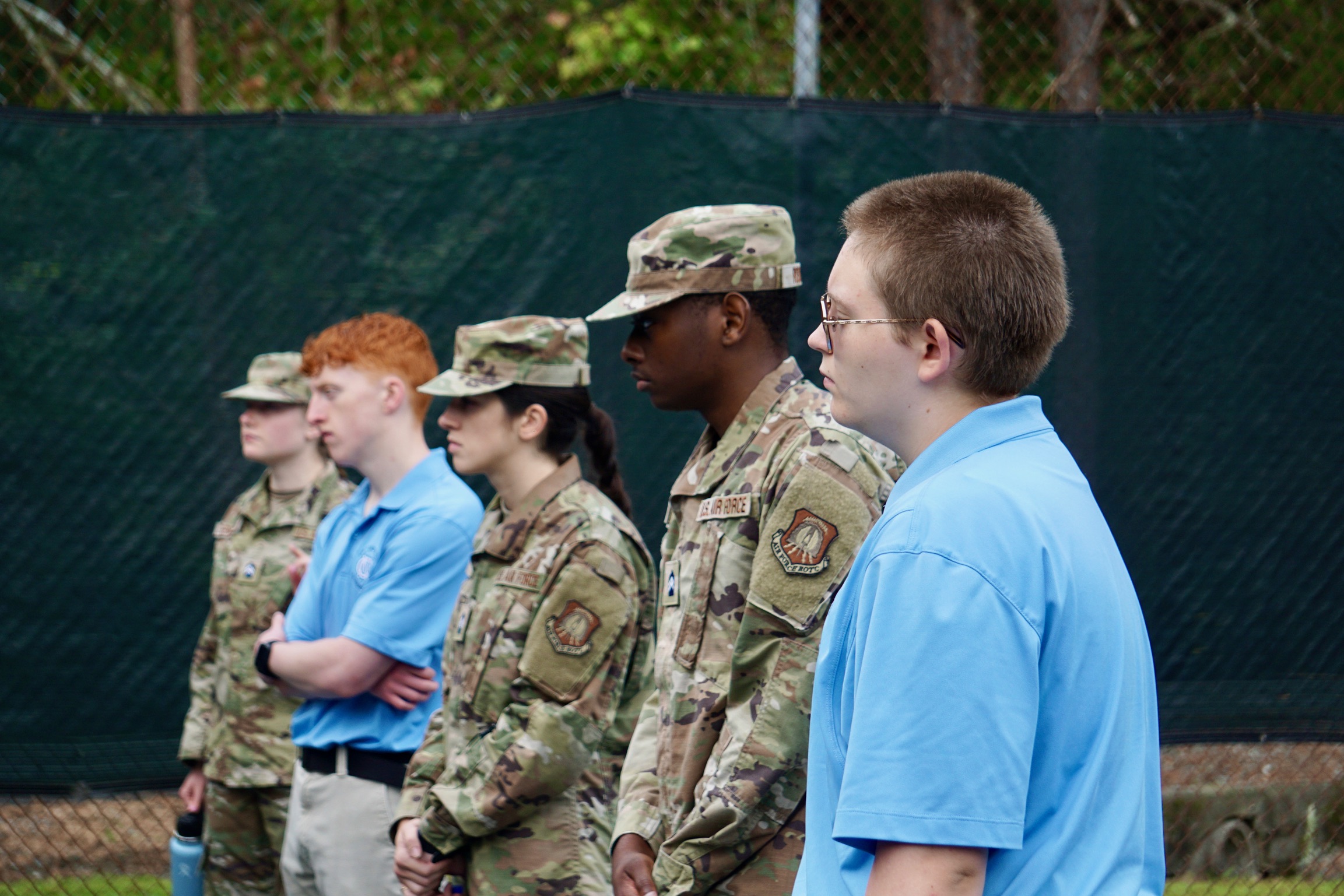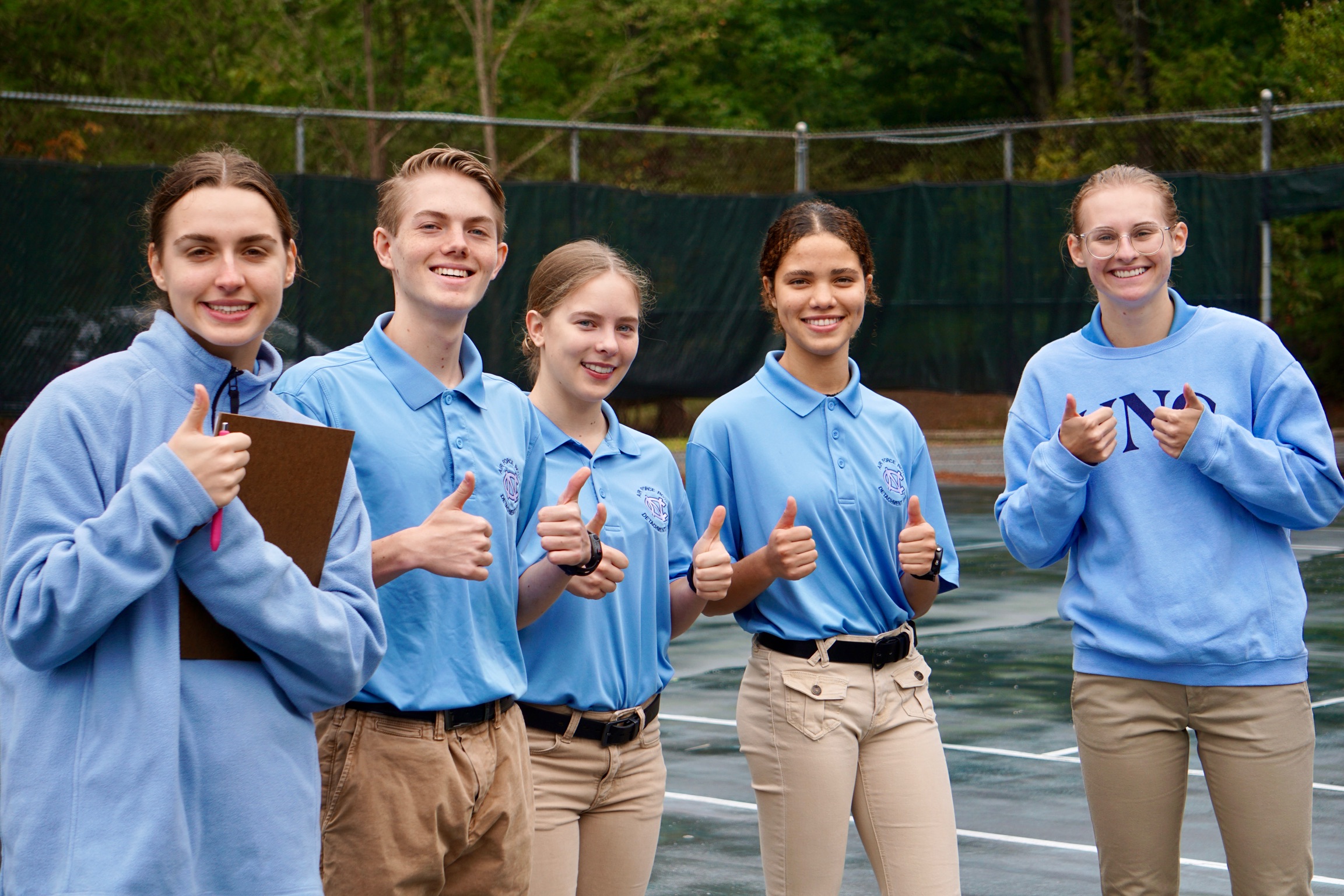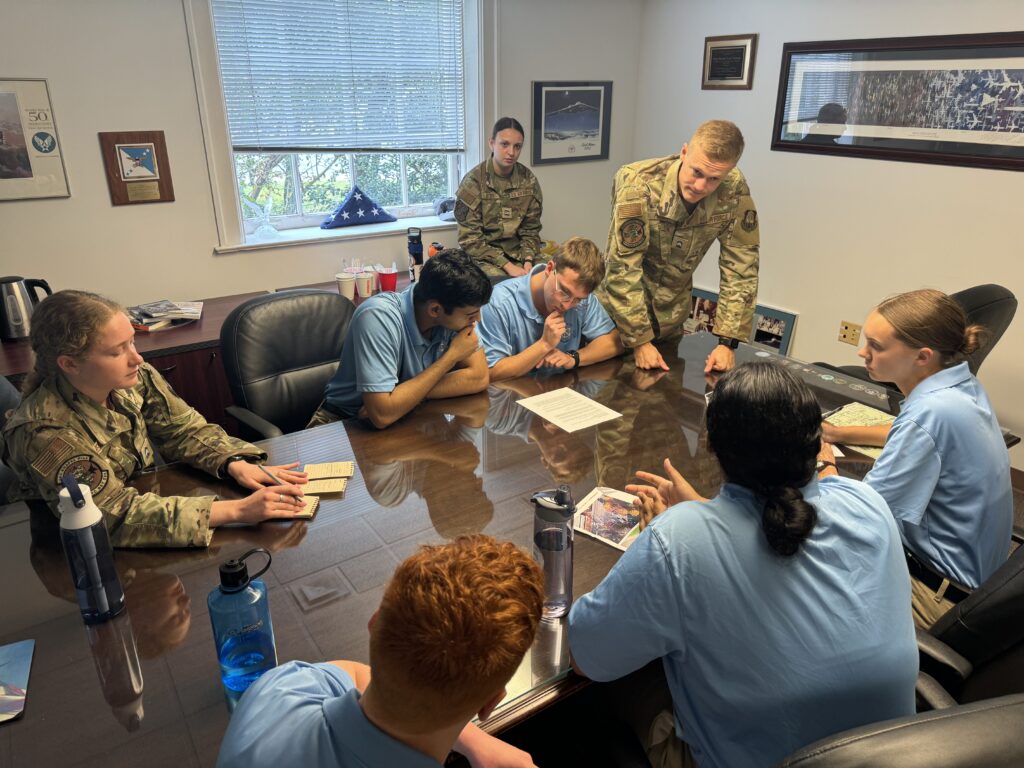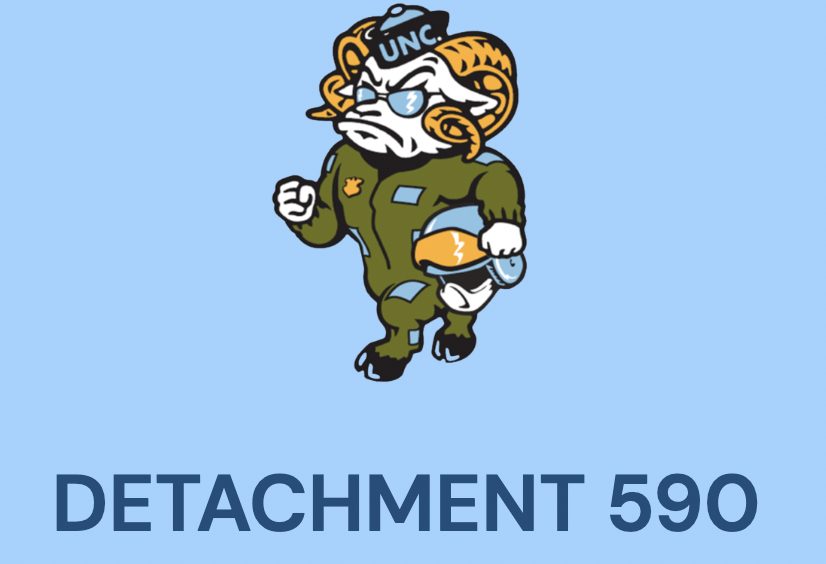
Curriculum
Department of Aerospace Studies
The Department of Aerospace Studies administers the United States Air Force Reserve Officer Training Corps (AFROTC) Program and has been an integral part of the University’s tradition of scholarship, excellence, and achievement since 1947. As the University continues its pursuit of excellence as the nation’s oldest state liberal arts university, Air Force ROTC will continue to develop outstanding officers who will serve the nation.
AERO Course Progression
Freshman Year
- AERO 101 Heritage and Values of the United States Air Force, Part 1 (1 credit). The course allows students to examine general aspects of the Department of the Air Force, Air Force benefits, and opportunities for Air Force officers. The course also lays the foundation for becoming an Airman such as AF customs and courtesies, AF dress and appearance, team building, communication skills, and more. As a whole, this course, combined with AERO 102, provides students with a knowledge-level understanding for the employment of air and space power, from an institutional, doctrinal, and historical perspective. The students will be introduced to the Air Force way of life and gain knowledge on what it means to be an Airman.
- AERO 102 Heritage and Values of the United States Air Force, Part 2 (1 credit). The course allows students to examine general aspects of the Department of the Air Force, Air Force Leadership, and the Air Force Core Values. As a foundational course, AS100 also provides a historical perspective such as lessons on war and US military, Air Force operations, principles of war, and airpower. As a whole, this course, combined with AERO 101, provides students with a knowledge-level understanding for the employment of air and space power, from an institutional, doctrinal, and historical perspective. The students will be introduced to the Air Force way of life and gain knowledge on what it means to be an Airman.
- AERO 500 Leadership Laboratory (0 credits). Required for all AFROTC cadets. The purpose of the LLAB program is to augment the AFROTC academic curriculum by providing prospective Air Force officers the opportunities and feedback needed to develop the leadership, managerial, and supervisory skills required of successful Air Force officers. The laboratory also offers insight into career opportunities in the USAF, life and work of the USAF junior officer, and military ceremonies.
Sophomore Year
- AERO 201 Team and Air Force Leadership Fundamentals, Part 1 (1 credit). This course is the first part of a two part course that focuses on laying the foundation for teams and leadership. The topics include skills that will allow cadets to improve their leadership on a personal level and within a team. The courses will prepare cadets for their field training experience where they will be able to put the concepts learned into practice. The purpose is to instill a leadership mindset and to motivate sophomore students to transition from AFROTC cadet to AFROTC officer candidate.
- AERO 202 Team and Air Force Leadership Fundamentals, Part 2 (1 credit). This course is the second part of a two part course that focuses on laying the foundation for teams and leadership. The topics include skills that will allow cadets to improve their leadership on a personal level and within a team. The courses will prepare cadets for their field training experience where they will be able to put the concepts learned into practice. The purpose is to instill a leadership mindset and to motivate sophomore students to transition from AFROTC cadet to AFROTC officer candidate.
- AERO 500 Leadership Laboratory (0 credits). Required for all AFROTC cadets. See previous slide.
Junior Year
- AERO 301 Leading People and Effective Communication (3 credits). Prerequisites, AERO 101, 102, 201, and 202. Part one of a two-part course that teaches cadets advanced skills and knowledge in management and leadership. Special emphasis is placed on enhancing leadership skills and communication. Cadets have an opportunity to try out these leadership and management techniques in a supervised environment as juniors and seniors. Class participation, comprehension, and oral communication skills are stressed.
- AERO 302 Leading People and Effective Communication (3 credits). Prerequisites, AERO 101, 102, 201, and 202. A continuation of AERO 301. Second part of a course that teaches cadets advanced skills and knowledge in management and leadership. Special emphasis is placed on enhancing leadership skills and communication. Cadets have an opportunity to try out these leadership and management techniques in a supervised environment as juniors and seniors. Class participation, comprehension, and oral communication skills are stressed.
- AERO 393 Air and Space Expeditionary Training (1 credit). Restricted to ROTC cadets from all services. Provides leadership training in a military environment. Professional development is achieved through academics, physical fitness, marksmanship, and leadership exercises. Course reviews leadership lessons in a simulated expeditionary deployment to a combat zone.
- AERO 500 Leadership Laboratory (0 credits). Required for all AFROTC cadets. See previous slide.
Senior Year
- AERO 401 National Security Affairs and Preparation for Active Duty (3 credits). Prerequisites, AERO 101, 102, 201, and 202. Part one of a two part class that is designed for college seniors and gives them the foundation to understand their role as military officers in American society. It is an overview of the complex social and political issues facing the military profession and requires a measure of sophistication commensurate with the senior college level. Class participation, comprehension, written and oral communication skills are stressed.
- AERO 402 National Security Affairs and Preparation for Active Duty (3 credits). Second part of a class that is designed for college seniors and gives them the foundation to understand their role as military officers in American society. It is an overview of the complex social and political issues facing the military profession and requires a measure of sophistication commensurate with the senior college level. This final semester provides information that will prepare the cadets for Active Duty. Class participation, comprehension, written and oral communication skills are stressed.
- AERO 500 Leadership Laboratory (0 credits). Required for all AFROTC cadets. See previous slide.

Minor in Aerospace Studies
The Minor in Aerospace Studies is a fourteen semester-hour non-technical course of study open to all University students. Students must complete a minimum of fourteen credit hours from the below listed courses with a grade of “C” or higher in each course.
AERO Courses
AERO 101 (1 credit)
AERO 102 (1 credit)
AERO 201 (1 credit)
AERO 202 (1 credit)
AERO 301 (3 credits)
AERO 302 (3 credits)
AERO 393 (1 credit)
AERO 401 (3 credits)
AERO 402 (3 credits)
AERO 213 (HIST 213, PWAD 213) (3 credits)

Academic Standards
Graded Work
- Letter grades represent the following levels of achievement as defined by the University of North Carolina:
- A = Highest level of achievement (100-93, A- 92.9-90)
B = Strong performance (89.9-83, B- 82.9-80)
C = Totally acceptable performance (79.9-73, C- 72.9-70)
D = Marginal performance (69.9-60)
F = Unacceptable performance (59.9-0) - Cadets cannot take Aerospace Studies academic courses as Pass-Fail. Graded work performed or submitted late will incur severe penalties. Late is defined as the inability to make a presentation on the class day scheduled, or submitting an assignment after the beginning of class period on its due date. There is no tolerance for lateness. Only extraordinary circumstances, such as hospitalization for a serious illness, will be considered for submitting work late. Also, in almost all circumstances, prior arrangements must be made with the instructor. The penalty for late work is a reduction of one letter grade per 24-hour period, with no credit after 72 hours (3 days).
The Honor System
All students at UNC have agreed to obey and enforce the UNC Honor Code, which “prohibits lying, cheating, or stealing.” Additionally, cadets will abide by the Cadet Honor Code, “We will not lie, steal, or cheat, nor tolerate among us anyone who does.” Honor and integrity are critical to becoming a professional Air Force officer.
Documentation
When submitting work for academic credit, it is assumed the work is the students’ own. Plagiarism is the act of using another person’s ideas, expressions, or thoughts without acknowledging the source. If students use quotations, text, or ideas from a source other than themselves, documentation is required. For written work, documentation is given using footnotes, references, or bibliographies. If help was received from another person in the accomplishment of an assignment, that collaboration must be documented.
Class Attendance
Students are expected to attend all classes. Lateness for class will not be tolerated and will count as an absence. All foreseeable absences must be coordinated with your instructor in advance. Except in cases of sickness or emergency, if it is necessary for a cadet to miss a class, a request to do so will be submitted to the instructor by military letter prior to the beginning of class to receive credit for the work due that day. University policy requires any student who misses three consecutive lessons, or misses more lessons than the instructor deems advisable, be reported to the Dean of the College of Arts and Sciences. Missing class without a valid excuse, due to circumstances within the student’s control, will result in significant loss of class participation points. Additionally, cadets missing more than 20% of Aerospace Studies classes will receive a failing grade in accordance with AFROTC directives. Students are academically accountable for all material covered while absent.
Classroom Conduct
Cadets are expected to adhere to proper military customs and courtesies. Cadets’ conduct, bearing, preparedness, and attendance are part of their class participation evaluation. Cadets will address the instructor as “Sir” or “Ma’am” or by military rank and last name. Disagreement and free expression of opinion is encouraged, but must be professional and courteous. To promote free expression, academic freedom and non-attribution will be observed. There will be no retribution for ideas or opinions expressed in class and students may not attribute an idea or opinion to an individual outside the classroom without that person’s consent. The classroom will be called to attention when the instructor enters the classroom, and when a senior officer enters the room (usually the instructor will do this). Cadets will wear their uniforms to class in accordance with AFROTC directives and the commander’s uniform wear policy. Civilian attire may be worn on days that the uniform is not required to be worn. Civilian attire should be conservative in nature. Stray talking, smoking, and eating is not allowed.
Individual Counseling
Once each semester cadets are required to meet individually with their instructor for mid-term counseling. This is an opportunity for the instructor to talk to cadets one-on-one, monitor their academic progress for the current term, review their academic plan (Form 48), and discuss any issues relating to AFROTC with them. The two weeks prior to fall/spring break is the usual time for these meetings. Cadets should see their instructor to schedule this appointment. All students are, however, free to stop by the instructor’s office at any time to discuss matters of interest.
